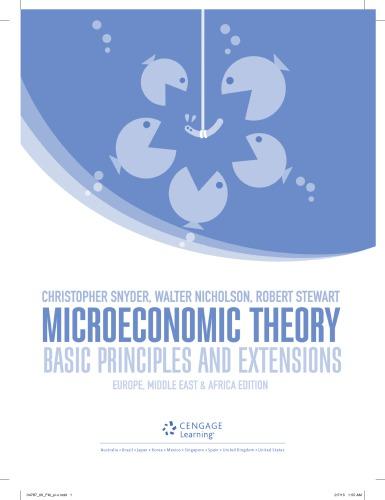8.9 fairness in the Ultimatum Game Consider a simple version of the Ultimatum Game discussed in the...
Question:
8.9 fairness in the Ultimatum Game Consider a simple version of the Ultimatum Game discussed in the text. The first mover proposes a division of €1. Let r be the share received by the other player in this proposal (so the first mover keeps 1 – r), where 0 ≤ r ≤ 1/2. Then the other player moves, responding by accepting or rejecting the proposal. If the responder accepts the proposal, the players are paid their shares;
if the responder rejects it, both players receive nothing.
Assume that if the responder is indifferent between accepting or rejecting a proposal, he or she accepts it.
a.
Suppose that players only care about monetary payoffs. Verify that the outcome mentioned in the text in fact occurs in the unique subgame-perfect equilibrium of the Ultimatum Game.
b.
c.
Compare the outcome in the Ultimatum Game with the outcome in the Dictator Game (also discussed in the text), in which the proposer’s surplus division is implemented regardless of whether the second mover accepts or rejects (so it is not much of a strategic game!).
Now suppose that players care about fairness as well as money. Following the article by Fehr and Schmidt cited in the text, suppose these preferences are represented by the utility function U1(x1, x2) = x1 − a|x1 − x2|, where x1 is player 1’s payoff and x2 is player 2’s (a symmetric function holds for player 2). The first term reflects the usual desire for more money. The second term reflects the desire for fairness, that the players’ payoffs not be too unequal.
The parameter a measures how intense the preference for fairness is relative to the desire for more money. Assume a < 1/2.
1.
Solve for the responder’s equilibrium strategy in the Ultimatum Game.
2.
3.
Taking into account how the second mover will respond, solve for the proposer’s equilibrium strategy r* in the Ultimatum Game. (Hint: r* will be a corner solution, which depends on the value of a.)
Continuing with the fairness preferences, compare the outcome in the Ultimatum Game with that in the Dictator Game. Find cases that match the experimental results described in the text, in particular in which the split of the pot of money is more even in the Ultimatum Game than in the Dictator Game. Is there a limit to how even the split can be in the Ultimatum Game?
Step by Step Answer:

Microeconomic Theory Basic Principles And Extensions
ISBN: 9781473729483
1st Edition
Authors: Christopher M Snyder, Walter Nicholson, Robert B Stewart






